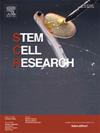Generation of human induced pluripotent stem cell lines from healthy Korean donors (IPBi101-A, IPBi102-A, IPBi103-A, IPBi105-A, IPBi107-A, IPBi108-A, IPBi110-A, IPBi111-A, IPBi113-A, and IPBi114-A)
IF 0.7
4区 医学
Q4 BIOTECHNOLOGY & APPLIED MICROBIOLOGY
引用次数: 0
Abstract
Human induced pluripotent stem cell (iPSC) lines were derived from peripheral blood mononuclear cells (PBMCs) obtained from ten healthy Korean donors of diverse ages and genders using a Sendai virus-based reprogramming method. These iPSC lines expressed markers of undifferentiated state and demonstrated trilineage differentiation potential in vitro. Characterization confirmed normal karyotypes, clearance of the Sendai virus, and short tandem repeat (STR) profiles identical to the parental PBMCs. These cell lines can serve as a valuable resource for disease modeling, drug screening, and as a human-based alternative to animal experiments.
韩国健康供体人诱导多能干细胞系(IPBi101-A、IPBi102-A、IPBi103-A、IPBi105-A、IPBi107-A、IPBi108-A、IPBi110-A、IPBi111-A、IPBi113-A和IPBi114-A)的生成
采用基于仙台病毒的重编程方法,从10名不同年龄和性别的韩国健康供者的外周血单个核细胞(PBMCs)中获得人诱导多能干细胞(iPSC)系。这些iPSC细胞系表达未分化状态标记物,并在体外表现出三龄分化潜力。鉴定证实核型正常,仙台病毒清除,短串联重复序列(STR)谱与亲本PBMCs相同。这些细胞系可以作为疾病建模、药物筛选的宝贵资源,并作为动物实验的人类替代品。
本文章由计算机程序翻译,如有差异,请以英文原文为准。
求助全文
约1分钟内获得全文
求助全文
来源期刊

Stem cell research
生物-生物工程与应用微生物
CiteScore
2.20
自引率
8.30%
发文量
338
审稿时长
55 days
期刊介绍:
Stem Cell Research is dedicated to publishing high-quality manuscripts focusing on the biology and applications of stem cell research. Submissions to Stem Cell Research, may cover all aspects of stem cells, including embryonic stem cells, tissue-specific stem cells, cancer stem cells, developmental studies, stem cell genomes, and translational research. Stem Cell Research publishes 6 issues a year.
 求助内容:
求助内容: 应助结果提醒方式:
应助结果提醒方式:


